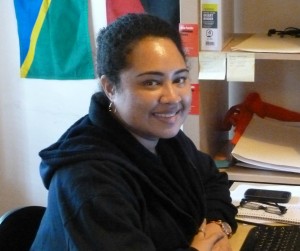Media
Learning to look at development through a gender lens
I will soon be completing my Masters in Development Studies at the University of Melbourne. In a few days, I will hand in my last few assignments and look forward to graduation day.

Tiri at work at the APJC office in Melbourne.
But sooner than that – today – I will be sending my last few emails and wrapping up my work as part-time Project Assistant with the Asia Pacific Journalism Centre (APJC).
My three months with APJC involved assisting with a five-week professional development training fellowship for 11 Pacific islands journalists. The fellowship involved skills delivery for reporting on economic issues that are of concern to women in the Pacific.
Prior to the fellows’ arrival in Australia, a lot of my time at APJC was spent taking care of logistical arrangements relating to the fellowship, corresponding with the fellows and eagerly shadowing the APJC staff to learn as much as I could about program management.
Once they were in Melbourne, I interacted more with the fellows, learning more about each one and the work they do in their home countries. It was motivating to see the passion each had for journalism and how they could each contribute to development in the Pacific.
It was evident to me that the combination of sessions that inspired good leadership, effective reporting and efficient use of new technology generated among the fellows a new-found respect and value for their profession and each other as journalists.
From my conversations with several of them, I gathered that the field trips, excursions and visits with Indigenous communities in Australia also created a deeper appreciation of the fellows’ own countries and cultures.
Experience allowed for personal growth
The gender-related sessions and interactions with senior women from a wide range of sectors left several fellows reflecting on the impact their work could make on women’s empowerment.
They appreciated the opportunity to talk with women in communities and, overall, to gain a deeper understanding of how development issues affect women of different backgrounds and how women are positive agents of change. Each fellow looked forward to returning home to implement and share what they had learned with their colleagues.
It was also wonderful to see this eagerness reflected in the group’s final evaluation reports and the emails they’ve been sending us since they returned home. Several of the emails describe the new initiatives they’ve started in their work, such as a new economic program with one of the news agencies and newly created discussion forums.
It was a joy to see these outcomes, especially after having the privilege of witnessing the thoughtful process that APJC and program facilitators took to developing the agenda for the fellowship.
The complementary sessions on leadership and personal development will go a long way for the fellows. Beyond that, as senior people from their own agencies, these nurtured qualities will surely inspire others with whom they work and their overall profession.
As I read the correspondence from the fellows, I too reflect on the impact that my experience with APJC and my studies here in Melbourne have made on my personal growth and my aspirations as a development practitioner.
Prior to commencing my studies, I had been working with remote rural communities in Fiji for five years. Throughout those years, my role shifted from working in projects related to health improvement, to natural resource management, to women and youth development.
Through my experience at work, I realised first-hand that the developmental challenges faced by communities continue to change and evolve. I also saw the importance for development practitioners such as myself to continually learn and adapt accordingly to be effective in our work.
Although I do not work as a journalist, I appreciate the important role that journalists have in keeping communities informed about development-related issues, especially in the Pacific islands.
I also appreciate that in recognition of the continued evolution of developmental challenges, APJC continues to work with journalists from Asia and the Pacific to build their capacities to report effectively on these issues.
Overall, while my studies have allowed me to understand theoretical frameworks around development, this has been further enriched through my experience with APJC. I have gained program management-related skills and developed an even greater appreciation of the intricacies of issues around development and gender.
Through my interactions with the fellows, I appreciate even more the unique contributions that people from different backgrounds can make to development in our own countries and communities. I look forward to engaging more with the fellows when I return home to work and to staying connected with APJC.